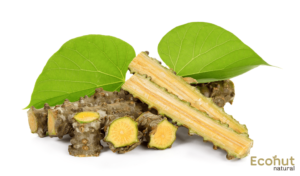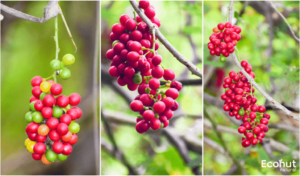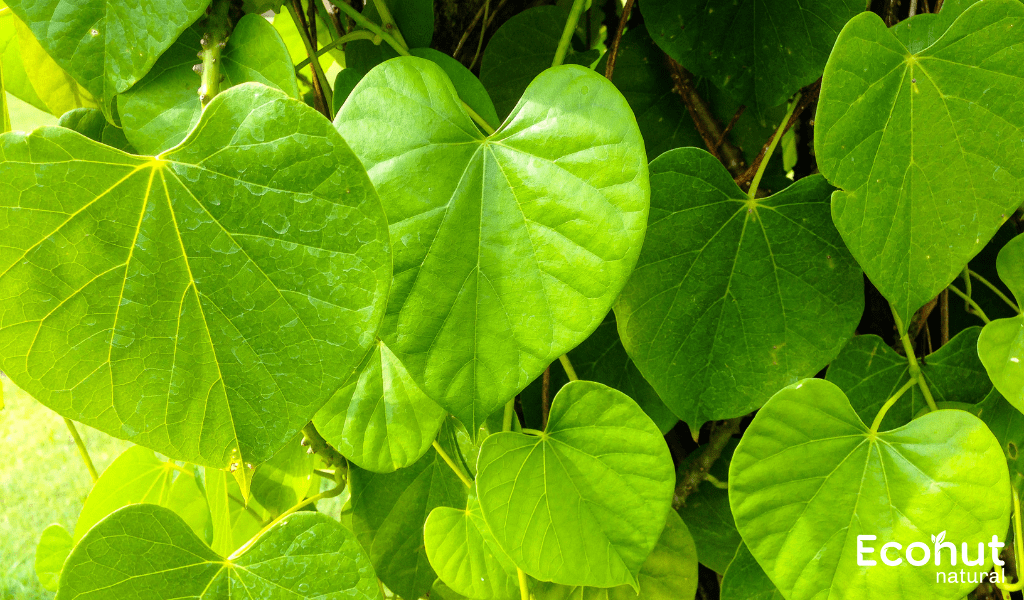Guduchi, scientifically known as Tinospora cordifolia, is a vital plant that modulates the immune system and is a fundamental component of many Ayurvedic formulas. The “Queen of Herbs,” Guduchi, is credited with promoting and restoring health as well as healing a number of illnesses and infections.
Guduchi, (Tinospora Cordifolia)This big, widely spreading, deciduous climbing shrub has many long, twining branches and characteristic greenish yellow blooms. The simple, heart-shaped leaves of the giloy shrub alternate with long, dark green petioles that can reach a length of 15 cm
Description
Guduchi is highly recognized for its several health advantages. Guduchi, also known as Amrutha, gets its name from the heavenly ambrosia, Amrutha, which is the celestial creatures’ secret to longevity and which, when consumed, grants one endless youth and energy.
Botanical Name:
Tinospora Cordifolia
Family:
Menispermaceae
Leaves:
Simple, alternating, and exstipulate leaves with long, roundish, pulvinate petioles that can reach a maximum length of 15 cm (6 in).The basal petiole is longer than the apical one, and it is partially and completely twisted. Its reddish fruit and heart-shaped leaves give rise to the name heart-leaved moonseed.
Flowers:
Small, greenish-yellow, unisexual flowers on distinct plants that develop when the plant has no leaves are seen on the axillary and terminal racemes. Female flowers are often solitary, while male flowers are grouped together. Six sepal’s total, divided into two series of three each. There are smaller exterior ones than inside ones.
Fruits:
Fruits tend to gather in groups of one to three. They are smooth, ovoid drupelets on thick stalks that with crimson or orange colored subterminal style scars.
Habitat:
Tinospora cordifolia is found in tropical regions of India, ranging from Kumaon to Assam, and situated 1200 meters above sea level. It is indigenous to Sri Lanka, Myanmar, and India. A common vine in dry and deciduous woodlands is giloy.
Parts Used:
- Leaves
- Bark
- Stem
- Roots
Dosage:
- Gilroy Satva – 500mg -1 gm
- Powder – 3-6 gm
Chemical Constituents
Guduchi, (Tinospora Cordifolia)- chemical components include phenolics, alkaloids, glycosides, steroids, aliphatic compounds, polysaccharides, and leaves that are high in calcium, phosphorus, and protein .

Medicinal properties
- Immunomodulator
- Rejuvenative
- Adaptogen
- Anti-inflammatory
- Mild Analgesic
- Antacid
- Febrifuge
- Anti-gout
- Anti-mutagenic
- Antioxidant
- Anticancer
- Anti-stress
- Antipruritics
Other Language Names of Guduchi, (Tinospora Cordifolia)
English name – Indian Tinospora, Heartleaved moonseed
Tamil name – Amrida valli, Silam, Pittigai
Sikkim name – Gurjo
Kannada name – Agniballi, Amrutaballi
Bengali name – Giloy, Gulancha
Oriya name – Gulochi, Gulancha
Gujarati name – Gulo, Gado, Galo
Punjabi name – Batindu, Gilogularich
Malayalam name – Amritavalli, Chitamrith
Telugu name – Dussiramu, Tippatige
Hindi name – Giloy, Gurach
Marathi name – Ambarvel, Amrita, Gulvel
Assamese name – Hoguni-lot
Konkani name – Amritvel
Urdu name – Guluncha
Nepalese name – Gurjo
Scientific Classification
| Kingdom | Plantae |
| Family | Menispermaceae |
| Order | Ranunculales |
Ayurvedic Properties
Hindi/Sanskrit
- Rasa -Kashaya.Tikta
- Guna -Laghu
- Virya -Ushna
- Vipaka -Madhura
English
- Taste -Astringent, Bitter
- Physical Property-Light
- Potency- Hot
- Metabolic Property (After Digestion)-Sweet
Guduchi, (Tinospora Cordifolia) Uses
- Constipation can be relieved by combining guduchi powder with jaggery or amla.
- Ginger can be taken with the powdered stem of Guduchi to help relieve joint pain.
- Generally speaking, you can increase the nutritious value of your usual recipes by including the dried and powdered leaves of Guduchi.
- Boiling Guduchi powder in water, letting it cool, and then applying it to the eyelids improves vision.
Guduchi, (Tinospora Cordifolia) Benefits
Regulates Diabetes:
Guduchi’s hypoglycemic quality is largely responsible for lowering the body’s blood sugar levels. When Guduchi is consumed, the β-pancreatic cells’ manufacturing of insulin becomes extremely active. It helps lessen the conversion of starch molecules into glucose, which controls blood sugar levels in the body and so treats diabetes.
Boosts Immunity:
Giloy enhances immunity by supporting white blood cell activity. It strengthens the body’s defenses against infections. Rich in alkaloids, glycosides, steroids, and other substances, it aids the body in reducing stress and boosting energy. Additionally, because it functions as an immunomodulator, it can help treat autoimmune diseases such as lupus, psoriasis, and arthritis.
Supports Digestion:
Overall health depends on digestive health, and Giloy can be a key component in maintaining it. It facilitates the assimilation of nutrients from food, soothes digestive issues, and helps with digestion.
Benefits the Liver:
guduchi, is a powerful hepatoprotective agent because of its ability to scavenge free radicals and promote liver regeneration. Additionally, giloy increases glutathione (GSH) levels and supports the liver’s removal of toxic waste from the body.
Treats Inflammatory Conditions:
Guduchi (Tinospora Cordifolia) is a valuable treatment for reducing pain and inflammation associated with gout and arthritis because of its potent anti-inflammatory and analgesic properties. Because of its potent analgesic properties, which reduce pain in the joints and muscles and reduce the likelihood of developing chronic autoimmune inflammatory disorders like rheumatoid arthritis.
Promotes joint health:
Strong anti-inflammatory and anti-arthritic properties can be found in giloy. It is quite helpful for treating arthritis-related muscular soreness and joint inflammation. One of the greatest herbs for gout, it balances the body’s levels of uric acid.
Don’t miss: Arjuna (Terminalia Arjuna) – Health Benefits, Uses and Side Effects
Guduchi, (Tinospora Cordifolia) Side Effects
Gastrointestinal upset:
After taking Guduchi, some people may have mild gastrointestinal distress, including nausea, vomiting, or diarrhea.
Blood sugar levels:
Guduchi may have a hypoglycemic effect. Diabetic sufferers may benefit from this, but it may potentially combine with diabetic drugs and result in dangerously low blood sugar levels.
Autoimmune diseases:
The immune system may be stimulated by guduchi. While this may help fight infections, it may also make autoimmune illnesses like multiple sclerosis, rheumatoid arthritis, and lupus worse.

Conclusion
Guduchi bestows upon us countless health advantages. Although this traditional herb is considered a strong immunomodulator, it is also very important for treating and managing conditions like fever, gout, gastritis, diabetes, liver difficulties, heart problems, mouth ulcers, reduced immunity, etc. Guduchi is a rejuvenating herb that you can simply enjoy with a doctor’s consultation beforehand, as there have been no documented antagonistic effects of this plant on the body.
FAQS
What advantages does Guduchi Tinospora cordifolia offer?
Diabetes, high cholesterol, hay fever, gout, rheumatoid arthritis, hepatitis, peptic ulcer disease , fever, gonorrhea, syphilis, and immune system stimulation are among the conditions for which Tinospora cordifolia is utilized.
Can Guduchi help with diabetes?
It lowers oxidative stress, increases insulin release, and decreases the body’s synthesis and breakdown of glucose to control blood sugar levels. Particularly beneficial for type 2 diabetes is guduchi.
Could I take Guduchi every day?
To get the advantages of guduchi in a traditional way, consume ¼ to ½ teaspoon of guduchi powder once or twice a day. It can be combined with warm water or added to another dosha-suitable anupan, or carrier material, like ghee, milk, or honey.

